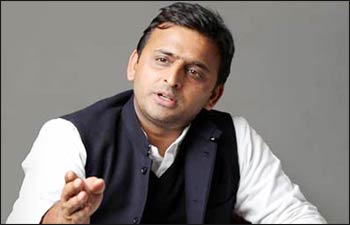 Lucknow, Nov 23: Chief minister Akhilesh Yadav took a dig at Narendra Modi on Friday saying the BJP's PM aspirant's campaign was heavily based on strong marketing tactics. Without taking Modi's name even once, Akhilesh said, "Ye sales aur marketing ke log hain. Inhe agar America ka visa milta to Taj Mahal ko bhi claim kar lete." (These people have built their image with the help of strong sales and marketing. If they were granted the US Visa, they would even stake claim to having built the Taj Mahal.)
Lucknow, Nov 23: Chief minister Akhilesh Yadav took a dig at Narendra Modi on Friday saying the BJP's PM aspirant's campaign was heavily based on strong marketing tactics. Without taking Modi's name even once, Akhilesh said, "Ye sales aur marketing ke log hain. Inhe agar America ka visa milta to Taj Mahal ko bhi claim kar lete." (These people have built their image with the help of strong sales and marketing. If they were granted the US Visa, they would even stake claim to having built the Taj Mahal.)
The CM was speaking at an event to flag off radio taxi services in 13 municipal cities of Uttar Pradesh.
Akhilesh also ridiculed Modi's dig at Gujarat lions taking over UP's Chambal valley. Implying UP knows how to tame the Gujarati lions, Akhilesh said the state government is making preparations to cage them within a "grand" 300 acre cage. Cheekily, he added that if Gujarat gave UP its lions, the most populous state of the country had also sent its share of "animals" to it.
Akhilesh, who has so far steered clear of political mud-slinging was more vocal than usual. A day after the Samajwadi Party rally in Bareilly drew large numbers, the CM's comments put a question mark on reports of a tacit understanding between the SP and the BJP. He said that the real battle of votes in UP was now actually a grassroots level fight over development. "This a battle of development in which SP is bound to win. People who are nothing more than media constructs will also be demolished by the media," he added.
UP CM, who laid emphasis on the government's commitment to its poll promises, said he was happy with the speed at which the government machinery was executing its plans. On Friday, Akhilesh laid the foundation stone of a 500-bed super-specialty cancer hospital and research and referral centre, flagged off radio cab service, launched online tax collection service for commercial vehicles in Ghaziabad and Lucknow and also laid the foundation stone for Awadh Shilp-gram along the lines of Dilli Haat, to encourage indigenous handicrafts.
Akhilesh also said that the ongoing political race in UP was worth nothing. "People from other states may come and stake their claim, but if you look at history you will know UP produces the prime ministers," he said, hinting at SP chief Mulayam Singh Yadav's prime ministerial aspirations.
Akhilesh also sharpened his attack against BSP chief Mayawati, claiming she had given out too many "sweeteners" to investors in UP and set a bad precedent. Saying his government and its officers were doing everything to attract industry, he said the BSP government has left the state's economy in a mess. "The condition of our economy is such that in many cases we will not get loans even if we want them," Akhilesh said. He also alleged that "pancham tal" (CM's secretariat) during Mayawati's term was forever researching new ways to increase corruption. The SP government, he added, was having to battle this while bringing fresh development to the state. "Now there are other people who are coming to UP to loot its coffers," he added, making yet another reference to Modi.





Comments
You - Tube is one of the most popular sites on the Internet, and
I can guarantee you, people aren't surfing You - Tube to read books.
First you would find that they are in the store that
day for the Labor Day sale since they saw, read or heard an advertisement.
Deciding on the right demographics for your network advertising and marketing strategies (Keeley: http://Youtube.com/watch?feature=youtube_gdata&v=gBT70G_lE70) advertising can be invaluable due to the fact you can immediate your advertising
correct at your target market.
Add new comment